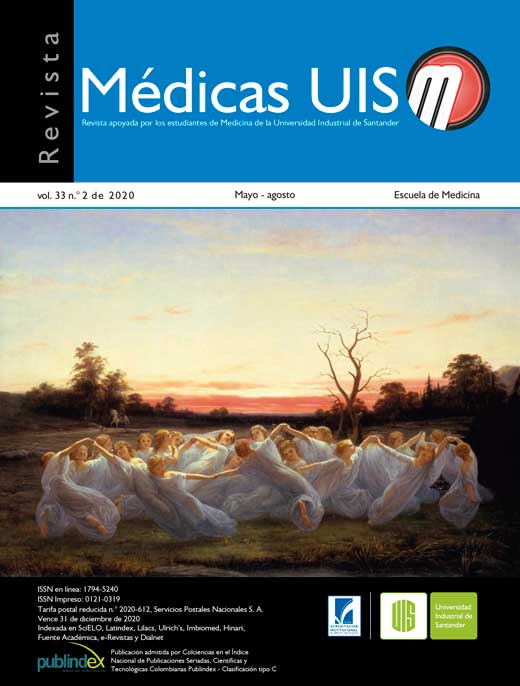Abstract
Introduction: chronic pelvic pain is a major problem due to its frequency and morbidity; it has a prevalence of 3.8%, it is considered one of the main indications for hysterectomy and laparoscopy. On the other hand, it is ppropriate to select the patients who benefit from a laparoscopy. Objective: to describe the clinical haracteristics, intraoperative findings, and surgical complications of patients with a diagnosis of chronic pelvic pain who underwent diagnostic and / or therapeutic laparoscopy at the University Hospital of antander between the months of June. 2010 to December 2013. Materials and methods: a descriptive and cross-sectional retrospective study was carried out. The analysis plan was carried out in the STATA 12.0 software with a significance level of 5%. Results: the population was made up of 41 women, the initial therapeutic approach was analgesic (55.3%), in a lower hormonal proportion (29%), however, in 70% of the cases, a combined treatment was started, as there was no response in none of the patients a surgical procedure was performed, finding 51.2% adnexal masses and 41.5% dense adhesions as the main causes of chronic pelvic pain. Conclusions: a better diagnostic approach must be made to optimally use the available resources. Finally, laparoscopy is very useful for the management of endometriosis and adherent syndrome. MÉD.UIS.2020;33(2):25-32.
References
Fuentes JS, Sepúlveda J. Abordaje integral del dolor pélvico crónico: revisión de la literatura. Rev Chil Obstet Ginecol. 2014; 79(4): 330- 339.
Green IC, Cohen SL, Finkenzeller D, Christo PJ. Interventional Therapies for Controlling Pelvic Pain: What is the Evidence?. Curr Pain Headache Rep 2010; 14(1): 22–32.
Vercellini P, Somigliana E, Viganò P, Abbiati A, Barbara G, Fedele L. Chronic pelvic pain in women: etiology, athogenesis and diagnostic approach. Gynecol Endocrinol. 2009; 25(3): 149-58.
Fall M, Baranowski AP, Elneil S, Engeler D, Hughes J, Messelink EJ, et al. EAU Guidelines on Chronic Pelvic Pain. Eur Urol. 2010; 57(1): 35-48.
Ayorinde AA, Bhattacharya S, Druce KL, Jones GT, Macfarlane GJ. Chronic pelvic pain in women of reproductive and postreproductive age: a population-based study. Eur J Pain. 2017; 21(3): 445-455.
González PA, Ruiz JI, Cubillana PL, Iñiguez GD, Morcillo JC, Albacete MP. Alternativa terapéutica para el dolor pélvico crónico de origen vesical. Actas urológicas españolas. 2009; 33(6): 681-685.
Howard FM. Chronic Pelvic Pain. Obstet Gynecol. 2003; 101(3): 594–611.
Yunker A, Sathe NA, Reynolds WS, Likis FE, Andrews J. Systematic review of therapies for noncyclic chronic pelvic
ain in women. Obstet Gynecol Surv. 2012; 67(7): 417-25.
Miller D. Keep a low threshold in diagnosing PID. Patient Care. 2000; 34(10): 75.
Guerrero AM, Gómez MP. VIII Estudio Nacional de Dolor 2014. Prevalencia del Dolor Crónico en Colombia Internet]. Colombia; 2014. Disponible en: https://dolor.org.co/biblioteca/encuestas/ VIII%20Estudio%20Prevalencia%20dolor%20cronico%20 n%20colombia%20publicacion%20pagina%20ACED%202014. pdf
Zubor P, Szunyough N, Galo S, Biringer K, Dókus K, Visnovský J, et al. Laparoscopy in Chronic pelvic pain - a prospective clinical study. Ceska Gynecol. 2005; 70(3): 225-31.
Clemons JL, Arya LA, Myers DL. Diagnosing interstitial cystitis in women with chronic pelvic pain. Obstet Gynecol. 2002; 100(2): 337-41.
Speer LM, Mushkbar S, Erbele T. Chronic Pelvic Pain in Women.Am Fam Physician. 2016; 93(5): 380-7.
Price J, Farmer G, Harris J, Hope T, Kennedy S, Mayou R. Attitudes of women with chronic pelvic pain to the gynaecological consultation: a qualitative study. BJOG. 2006; 113(4): 446-52.
Tu FF, Holt J, Gonzales J, Fitzgerald CM. Physical therapy evaluation of patients with chronic pelvic pain: a ontrolled study. Am J Obstet Gynecol. 2008; 198(3): 272.e1-272.e7.
Shelkey J, Huang C, Karpa K, Singh H, Silvis M. Case report: Pelvic Congestion Syndrome as an Unusual Etiology for Chronic Hip Pain in 2 Active, Middle-age Women. Sports Health. 2014; 6(2): 145-8.
Gelbaya TA, El-Halwagy HE. Focus on Primary Care: Chronic Pelvic Pain in Women. Obstet Gynecol Surv. 2001; 6(12): 757- 64.
Derasari MD. Taxonomy of pain syndromes: classification of chronic pain syndromes. En: Raj PP, Abrams BM, Benson HT, et al., eds. Practical Management of Pain. 3rd ed. St. Louis: Mosby, Inc; 2000. 10-16.
Tirlapur SA, Daniels JP, Khan KS. Chronic pelvic pain: how does noninvasive imaging compare with diagnostic laparoscopy?. Curr Opin Obstet Gynecol. 2015; 27(6): 445-8.
Howard FM. The role of laparoscopy in the chronic pelvic pain patient. Clin Obstet Gynecol 2003; 46(4): 749-66.
Latthe P, Mignini L, Gray R, Hills R, Khan K. Factors predisposing women to chronic pelvic pain: systematic review. BMJ. 2006; 332(7544): 749-55.
Hebbar S, Chawla C. Role of Laparoscopy in evaluation of chronic pelvic pain. J Minimal Access Surg. 2005;1(3): 116-20.
Metler L, Alhujicily M. Role of laparoscopy in inidentifying the clinical significance and cause of adhesions and hronic pelvic pain: a retrospective review at the Kiel school of Gynecological Endoscope. JSLS. 2007;11(3):303-8.
Zondervan K, Barlow DH. Epidemiology of chronic pelvic pain. Baillieres Best Pract Res Clin Obstet Gynaecol. 2000;14(3):403- 414. Steege JF. Dolor pélvico crónico. México, DF: McGraw-Hill ompanies; 2000.
Behera M, Vilos G, Hollett-Caines J, Abu-Rafea B, Ahmad R. Laparoscopic findings, histopathologic evaluation, and linical outcomes in women with chronic pelvic pain after hysterectomy and bilateral salpingo-oophorectomy. J Minim nvasive Gynecol. 2006;13(5):431-435.
Criollo C, Romero N, Salazar O, Briceño F, Navarro H, Herrera J. Características ginecológicas y psicosociales del dolor pélvico crónico. Rev Colomb Obstet Ginecol. 2004;55(2):129-135.
Fall M, Baranowski A, Elneil S, Engeler D, Hughes J, Messelink E, et al. EAU Guidelines on Chronic Pelvic Pain. Eur urol. 2010;57(1):35-48.
Stones W, Cheong YC, Howard FM, Singh S. Interventions for treating chronic pelvic pain in women. Cochrane Database Syst Rev. 2005; Issue 2. Art. No.: CD000387.
Van den Beukel BA, de Ree R, van Leuven S, Bakkum EA, Strik C, van Goor H, et al. Surgical treatment of adhesion-related chronic abdominal and pelvic pain after gynaecological and general surgery: a systematic review and meta-analysis. Hum Reprod Update. 2017;23(3):276-288.
Farquhar CM, Steiner CA. Hysterectomy rates in the United States 1990-1997. Obstet Gynecol. 2002;99(2):229-34.
Gunter J. Chronic Pelvic Pain: An Integrated Approach to Diagnosis and Treatment. Obstet Gynecol Surv. 2003; 58(9):615-23.

This work is licensed under a Creative Commons Attribution 4.0 International License.
Copyright (c) 2020 Médicas UIS
